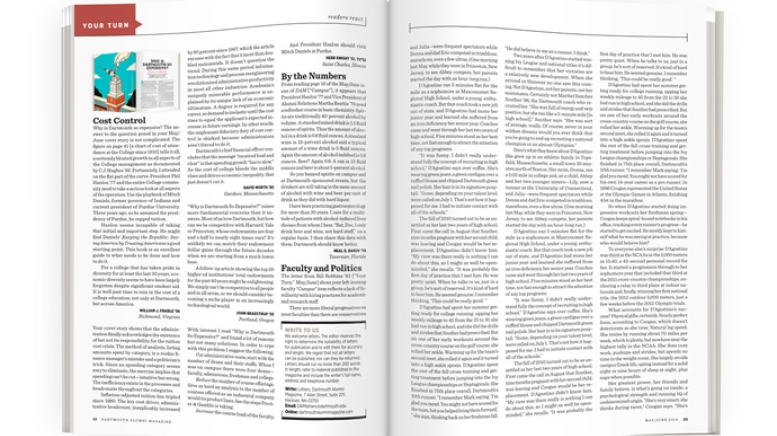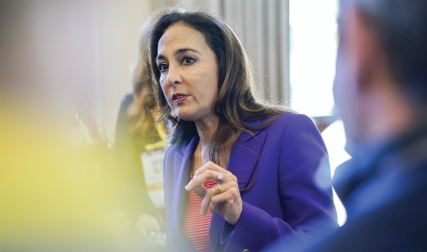Cost Control
Why is Dartmouth so expensive? The answer to the question posed in your May/June cover story is not complicated. The figure on page 41 [a chart of cost of attendance at the College since 1910] tells it all, a seriously bloated growth in all aspects of the College management as documented by C.J. Hughes ’92. Fortunately, I attended on the flat part of the curve. President Phil Hanlon ’77 and the entire College community need to take a serious look at all aspects of the operation. Use the playbook of Mitch Daniels, former governor of Indiana and current president of Purdue University. Three years ago, as he assumed the presidency of Purdue, he capped tuition.
Hanlon seems incapable of taking that initial and important step. He might find Daniels’ Keeping the Republic: Saving America by Trusting Americans a good starting point. This book is an excellent guide to what needs to be done and how to do it.
For a college that has taken pride in diversity for at least the last 30 years, economic diversity seems to have been largely forgotten despite significant student aid. It is well past time to rein in the cost of a college education, not only at Dartmouth, but across America.
William J. Frable ’56
Richmond, Virginia
Your cover story shows that the administration finally acknowledges the existence of but not its responsibility for the tuition cost crisis. The method of analysis, listing amounts spent by category, is a rookie finance manager’s mistake and a politician’s trick. Since no spending category seems easy to eliminate, the exercise implies that spending can’t be cut—intuitive but wrong. The inefficiency exists in the processes and headcounts throughout the categories.
Inflation-adjusted tuition has tripled since 1980. The key cost driver, administrative headcount, inexplicably increased by 80 percent since 1987, which the article excuses with the fact that it more than doubled nationwide. It doesn’t question the trend. During this same period information technology and process reengineering revolutionized administrative productivity in most all other industries. Academia’s uniquely miserable performance is explained by its unique lack of an economic ultimatum. A degree is required for any career, so demand is inelastic until the cost rises to equal the applicant’s expected increase in future earnings. In other words, the unpleasant fiduciary duty of cost control is shirked because administrators aren’t forced to do it.
Dartmouth’s chief financial officer concludes that the message “received loud and clear” is that spending growth “has to slow.” As the cost of college bleeds the middle class and drives economic inequality, that just doesn’t cut it.
David North ’85
Gardner, Massachusetts
“Why is Dartmouth So Expensive?” raises more fundamental concerns than it answers. Most of us love Dartmouth, but how can we be competitive with Harvard, Yale or Princeton, whose endowments are four and a half to nearly eight times ours? It’s unlikely we can match their endowment dollar gains through the future decades when we are starting from a much lower base.
A follow-up article showing the top 20 higher ed institutions’ total endowments for the past 40 years might be enlightening. We simply can’t be competitive to all people and in all areas, so we should consider becoming a niche player in an increasingly technological world.
John Braestrup ’55
Portland, Oregon
With interest I read “Why is Dartmouth So Expensive?” and found a lot of reasons but not many solutions. In order to cope with this problem I suggest the following.
Cut administrative costs; start with the number of deans and their staffs. When I was on campus there were four deans—faculty, admissions, freshman and college.
Reduce the number of course offerings. Give as hard an analysis to the number of courses offered as an industrial company would its product lines. See the steps Procter & Gamble is taking.
Increase the course load of the faculty.
And President Hanlon should visit Mitch Daniels at Purdue.
Herb Knight ’51, Tu’52
Saint Charles, Illinois
By the Numbers
From reading page 16 of the May/June issue of DAM [“Campus”], it appears that President Hanlon ’77 and Vice President of Alumni Relations Martha Beattie ’76 need a refresher course in basic chemistry. Spirits are traditionally 40-percent alcohol by volume. A standard mixed drink is 1.5 fluid ounces of spirits. Thus the amount of alcohol in a drink is 0.6 fluid ounces. A standard wine is 12-percent alcohol and a typical amount of a wine drink is 5 fluid ounces. Again the amount of alcohol imbibed is 0.6 ounces. Beer? Again 0.6: A can is 12 fluid ounces and beer is about 5-percent alcohol.
So you banned spirits on campus and at Dartmouth-sponsored events, but the drinkers are still taking in the same amount of alcohol with wine and beer per unit of drink as they did with hard liquor.
I have been practicing gastroenterology for more than 30 years. I care for a multitude of patients with alcohol-induced liver disease from whom I hear, “But, Doc, I only drink beer and wine, not hard stuff,” on a regular basis. I then share this data with them. Dartmouth should know better.
Neal E. Rakov ’74
Tavernier, Florida
Faculty and Politics
The letter from Bill Robbins ’83 [“Your Turn,” May/June] about your left-leaning faculty “Campus” item reflects a lack of familiarity with hiring practices for academic and research staff.
There are more liberal progressives on most faculties than there are conservatives because there is no political bias in the selection process. University professors are selected for their relative excellence in teaching and research, and scientists for their research record and promise. In my experience as a professor and research scientist, political or religious inclinations are never queried.
And, by the way, imposing intellectual restrictions on your faculty hiring automatically restricts your field of applicants and hence the quality of your staff.
Buster Welch ’63
Manitoba, Canada
A number of my fellow alumni have expressed concern that apparently 88 percent of faculty have some sort of an affiliation with the Democratic Party, while only 12 percent espouse the Republicans, and that this indicates some sort of flaw in the process of selecting professors. Since it is reasonable to assume that our Dartmouth faculty is pretty intelligent and thoughtful, I suggest a different conclusion. Perhaps the above statistics are just a measure of the relative validity of the political positions of the two parties.
Seth H. Washburn ’43
West Bath, Maine
Before GPS
The article by Sam Hull ’56 about a ski trip to Aspen, Colorado [“Breakaway,” May/June], brought back memories. The drill had not changed much by the mid-1960s: locating a ride to Colorado on Thayer’s bulletin board, meeting new schoolmates (some with zero winter-driving experience) and loading a vehicle of dubious provenance for the marathon drive west.
Two memories stand out. First, spinning our car into a ditch at night during a blizzard and having to spend two days in Athol, Kansas (cue the inevitable name-play), until the highway reopened. Harris Saxon ’65, marooned in the same storm, staggered to an empty house (which turned out to be a one-room schoolhouse) and spent the next morning answering the phone to tell parents that, yes, school was canceled that day.
The second memory is of a driver change in rural Iowa, around 2 a.m. We pulled into an all-night restaurant, roused the sleeping relay driver from the back seat, got some soup and coffee and hit the road again. It was only after we had driven some 20 or 30 miles into the Iowa dark that the man riding shotgun realized that the freshly awakened driver was aimed not toward Denver, but back toward Hanover.
Tom Meacham ’65
Anchorage, Alaska
In Defense of Frats
Your “Students and Profs Seek Change” “Campus” item [January/February], which focused on an editorial in The Dartmouth written by very few students, omitted several facts favorable to Dartmouth’s Greek system, which I support as the chairman of an ad hoc Alumni Council committee.
First, a whopping 87 percent of Dartmouth students surveyed by The Dartmouth last fall opposed abolition of the Greek system. Second, 70 percent of eligible men and women join fraternities and sororities while at Dartmouth. The participation rates for women and men are roughly equal. Third, you neglected to note that other editors and many students roundly criticized The D editorial. Finally, your article failed to note that last fall the student Greek Leadership Council presented President Phil Hanlon ’77 with a comprehensive proposal for improving the system, much of which has been adopted in the Moving Dartmouth Forward initiative.
It appears a majority of the Dartmouth community will be supportive of President Hanlon’s recent decision to support and improve the Greek system, rather than abolish it.
John “J.B.” Daukas ’84
Dover, Massachusetts
Frivolity
Jim Ruxin ’70 derides “the frivolous lawsuits brought in 2007 and 2008” as an “attempt by the right to advocate for their agenda in higher education” [“Your Turn,” March/April]. As legal liaison for the Association of Alumni executive committee that sued after months of futile entreaty to meet with trustees and encountered only intransigence, I submit that his charge is nonsense on both counts.
Frivolous? The College constantly attached the adjective to our effort to stop the trustees’ unilateral abrogation of the 1891 pact, but the New Hampshire court rejected its motion for dismissal, finding that there was “ample” evidence to warrant proceeding. Ironically, the College itself, in defending against other, previous suits, had thrice invoked the very 1891 governance contract we strove to protect. Our suit failed, not in court, but solely because of election of a new executive committee that immediately withdrew the suit “with prejudice,” meaning the question could never again be raised in court.
Agenda? Another echo of College propaganda. It was the trustees who plotted radical change. The 1891 accord had made Dartmouth unique: Through parity between directly and indirectly elected trustees it conveyed stewardship to all alumni. To facilitate that participation we eliminated presence in Hanover as a condition for alumni association voting, instituted rules of order in meetings and required freely available transcriptions of executive committee proceedings—all initiatives strenuously impeded by our opposition. A right-wing plot? Not a single action we undertook served any political agenda other than to assure democratic exercise of responsibility assigned in the 1891 pact. Indeed, when the executive committee majority voted to inform alumni of the board’s steps to override that contract, the committee’s secretary (the College’s director of alumni affairs) denied us access to the addresses of the association’s own members! Defying a threatened suit, I personally staked the funding for the mailing.
Finally, although Dinesh D’Souza ’83 publicly supported our efforts, he was never involved in our deliberations or, in any connection, with the suit.
Frank Gado ’58
White River Junction, Vermont
As one of the alumni association executive committee members involved, I take exception to Ruxin’s letter. We were not motivated by political ideology or by a misogynist agenda to repeal coeducation, as is often charged. People should recall this was a time when petition trustees were critical of fiscal mismanagement by a bloated administration, something I personally witnessed living adjacent to the campus and being actively engaged in various College advisory groups. How ironic that during the subsequent short-term tenure of Jim Kim the long-denied financial waste was finally evidenced by extensive budget cuts forced on the College, proving the petition trustees correct in their criticisms. If the College was damaged, it was not by our actions but by the administration’s sad-but-successful attempt to silence opposing views.
Tim Dreisbach ’71
South Royalton, Vermont
Anti-Science
The big play you gave to your “Earth Mother” cover story on Louise Erdrich ’76 [January/February] disappointed me because it obviously shows where your sympathies lie. The left-wing environmentalists are doing all they can to recruit the political support of groups such as college students, just as the Nazis recruited their Hitlerjugend in the 1930s. They have also targeted Native Americans. They are not just ignorant of actual climate science, they are anti-science to boot. Their latest triumph has been to get native Hawaiians to oppose siting a telescope on Mauna Kea for specious Native religious reasons. Their ultimate goal is to do everything possible to suppress production of carbon dioxide, which, according to their pseudo-scientific belief, will cause dangerous global warming if allowed to continue.
In pursuit of that goal they have embarked upon a campaign of divestment in our colleges, including Dartmouth. I was shocked to find that their divestment group from Dartmouth has embarked upon a campaign to use Facebook as a propaganda medium to spread their misinformation among a scientifically uninformed public. Note the absence of science in their arguments.
Arno Arrak ’51
Dix Hills, New York
Tabloid Fodder?
I was seriously disappointed that DAM chose to publish a near-gleeful feature on the campaign contribution woes of Dinesh D’Souza ’83 [January/February] that seemed to revel in what was a trivial (though dumb and wrong) attempt by D’Souza to aid the senatorial campaign of fellow conservative Wendy Stone Long ’82.
Can we now expect DAM to commission an article on another Dartmouth friend’s political travails—those of former Oregon Gov. John Kitzhaber ’69? Compared with liberal use of taxpayer money by the president and members of Congress to buy the favor of voters, D’Souza’s and Kitzhaber’s infractions are lost in rounding errors. However, my guess is that flaming a conservative such as D’Souza sits better with DAM’s—and perhaps Dartmouth’s—liberal postures.
Randall J. Pozdena ’69
Portland, Oregon
Wading In
Congratulations on your “Tipping Point” cover story [September/October]. Your promise to present “a balanced take on what’s happening at Dartmouth” and wade in on the controversies is here fulfilled.
Bruce Ducker ’60
Denver




